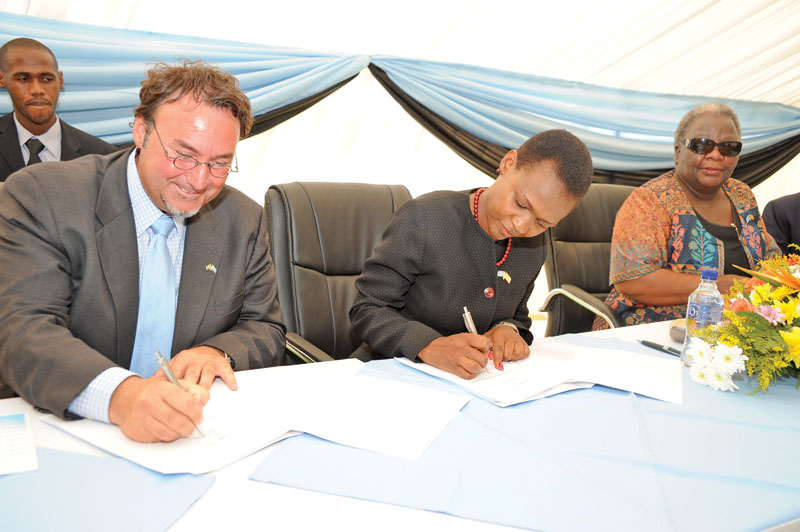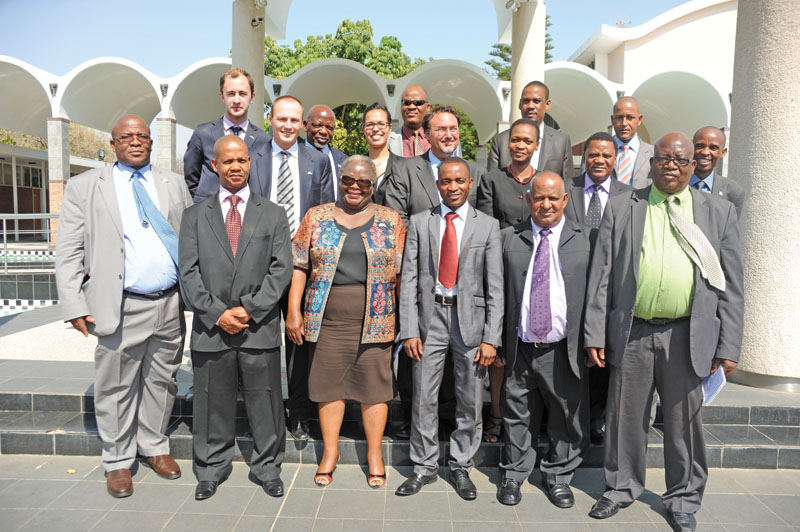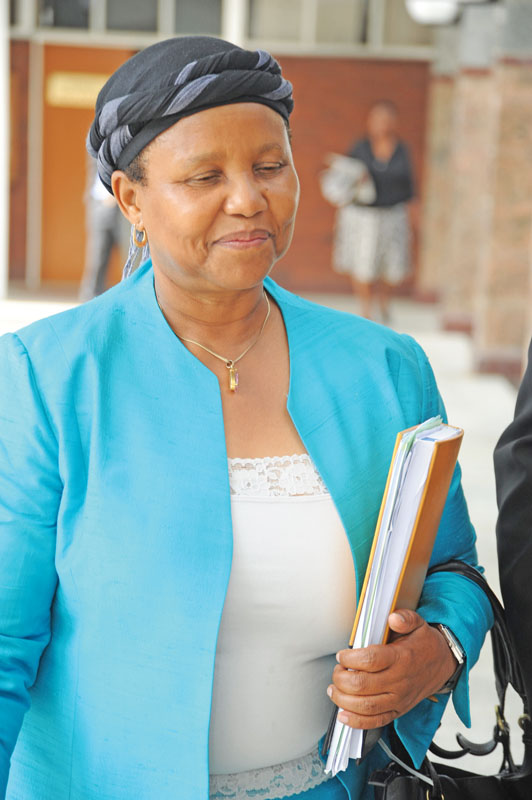Botswana speaks e-Governance
Source : Kutlwano
Author : Calviniah Kgautlhe
Location : Gaborone
Event : Interview
In this day and age exists an e-generation wired with a dot.com psyche whose political, social and economic lives are ruled by the power of technology.
It is undeniably an insuperable power that makes the world go round. Hence, governments in developed countries have infused technologically advanced e-governance systems into parliamentary structures to enable greater voter participation.
Consequently, most governments in developing countries have as well embraced these systems and are striving to incorporate them into their governance models to enhance democracy. United Nations (UN) e-Government Survey 2012 reveals that, “Africa remains at the tail end of the digital divide” as compared to other countries.
That notwithstanding, Botswana was ranked amongst the top 10 countries at the forefront of e-governance in Africa.
To keep up with this noble undertaking that gives nations a global competitive edge, Botswana Parliament in conjunction with the Swedish Trade Council, Swedish Aid Agency (SIDA), Gov2U and Stockholm University, launched ‘Botswana Speaks` – an e-democracy initiative on October 8 last year.
The project is now undergoing the pilot phase.
To track project progress, Kutlwano contacted project director in Sweden, Vasilis Koulolias, who said “A lot of African countries have skipped the stage of broadband Internet and have directly embraced mobile broadband with an increasing number of mobile Internet users. It is the case in Botswana.
Therefore, it is crucial that when conceptualising and designing Botswana Speaks e-democracy project, we look ahead in information technology infrastructures and see what can be done accordingly”.
Koulolias assured that project partners were on the ground getting ready for the pilot phase which was luanched last month.
The development of the online platform has been finalised and was also to be presented to Members of Parliament and staff.
Koulolias highlighted that, “Members of Parliament, constituency officers and staff in the Parliament involved in the project will be trained during the pilot phase by the project partners on how to use the online platform. A strong emphasis will be placed on the use of the mobile version of the platform for citizens.”
The pilot phase has been launched in four constituencies of Nata/Gweta, Boteti North, Maun West and South East South.
The initiative, said Koulolias, “will allow citizens to share their input and opinions and concerns in their area or take part in discussions on legislation as discussed in the National Assembly.
The online platform goes together with the implementation of constituency meetings in the four constituencies to gather citizens` inputs offline to then be made available to MPs online.”
“The originality of this project is that it does not aim to implement an ICT tool without looking at the traditional role of chiefs in the local politics. Rather, it incorporates ICT tools within the traditions and does not look only at online tools but at the offline world as well,” he explained.
Commenting on this new political development, Balete`s Kgosi Mosadi Seboko openly embraced the development, describing it as a progressive move towards reinforcement of Botswana`s shinning egalitarian ethos.
“I am cognizant of the fact that culture is dynamic and the world is not static, let Botswana Speaks not clash with our traditional Kgotla proceedings. Our traditional Kgotla system remains relevant today and the new technology must augment, rather than replace the Kgotla.”
“It will be appreciated if legislators were to gather all opinions and views through the new system - Botswana Speaks - and present them in a Kgotla set up to cater for those who are unable to access or use this technology,” the royal emphatically stated.
Also belonging to the same school of thought as Kgosi Seboko on culture is a well established author and academic, Morag Bell in her book, Contemporary Africa, where she posits that “The African people are not passive victims of the processes of change within the limits set by the broader political economy, the behavior of individuals, conditioned by their established norms and values, does in turn shape and reproduce the system. Culture is not static and immutable”.
To further give insight into what Botswana Speaks e-governance initiative has in store for Batswana besides examining the possible setbacks of the project and how they could be overcome, a Political Scientist, Professor David Sebudubudu, opined in an interview that he project was a good initiative that would profoundly transform Botswana`s political landscape.
Sebudubudu hailed it as a good development for democracy which would supplement and upgrade Botswana`s conventional democratic systems which were not efficient, as evidenced by increased voter apathy of the youth.
“Statistics show that the voter is getting younger, and Botswana is regarded by the UN as having a youth bulge, of Botswana`s two million population, people over 50 years are slightly over 100 000,” he said.
The e-governance initiative would, therefore, assist in integrating the views of young people and help curb voter apathy as young people would communicate in modes appropriate to their time.
“It will empower the electorate for it is more than just a mere form of communication, it will leave a trail and hold MPs accountable. It will increase information exchange speed, enhance wider reach of the electorate`s pool as well as increase transparency and accountability of the office bearers, cost efficiency and effectiveness.
It will also save time and resources MPs use to address numerous Kgotla meetings,” said Sebudubudu.
He warned that, “if the introduction of Botswana Speaks entails cost bearing or charge on the electorate it may not work effectively”.
Issues of technology go hand in hand with literacy, he said, “with Botswana`s 85 per cent literacy rate, the remaining 10-15 per cent of the illiterate population might not be able to use such technology as it will not be applicable to them.
This class of people must be catered for to enable them to voice their views and opinions. ”
Scholars, Singara Karna and Divya Gupta in their paper Fostering e-government as State Social Responsibility (SSR): Case Study of an Australian City Council say even in developed countries challenges are still being faced in administration of e-governance, and reaching an ideal model.
“Discussions and debates have continued since then on the happenings across the world and on hurdles and challenges being faced or envisaged in reaching the ideal state of e-Government.
Certainly, the journey so far, has not been simple and easy because there is no universal fit.
Each State has to arrive at its own appropriate fit taking into consideration the socio-economic-cultural-political-diversity mix and infrastructural & technological capabilities,” they posit.
On the other hand, United Nations (UN) e-Government Survey 2012 reveals that the digital divide is still an obstacle. With all the cutting-edge technologies and development of social media and networking tools, which have re-shaped parts of the modern world, it is becoming more challenging to diminish the digital divide.
Not only is the non-availability of infrastructure such as broadband the main reason behind this divide but differences in skills and lack of means to access information also play a major role.
Therefore, it is vital for governments to learn from global best practices and collaborate internationally to develop a harmonised framework with indigenous ICT content.
Furthermore, the report states that the key challenge for the e-government development of Africa remains the widespread lack of infrastructure and functional literacy.
Despite recent expansion in mobile telephony, most countries in Africa remain at the tail end of the digital divide.
With all the aforementioned challenges that come with project implementation of the e-democracy project piloting phase, it remains to be seen whether it will launch Botswana as an African leader in e-democracy. Ends
Teaser:
Members of Parliament, constituency officers and staff in the Parliament involved in the project would be trained during the pilot phase by the project partners on how to use the online platform. A strong emphasis would be placed on the use of the mobile version of the platform for citizens.















